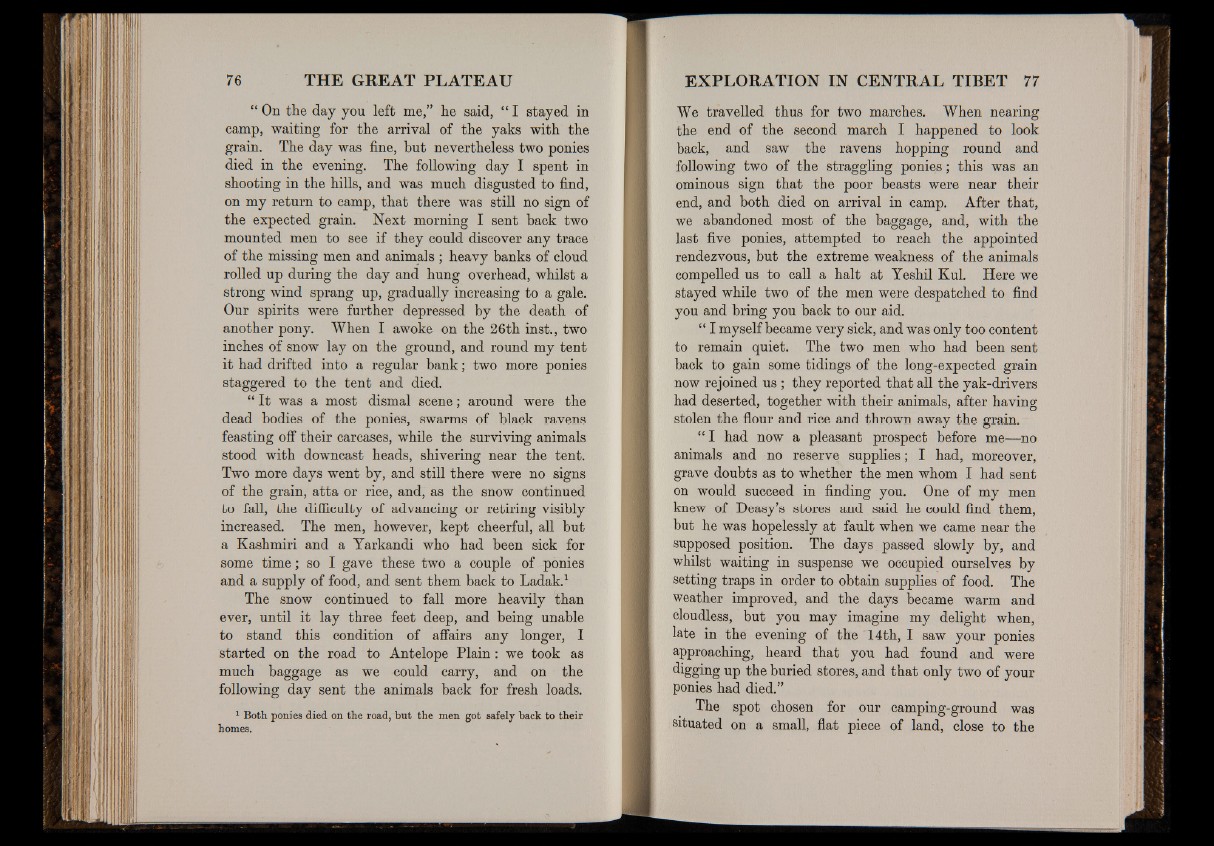
“ On the day you left me,” he said, “ I stayed in
camp, waiting for the arrival of the yaks with the
grain. The day was fine, but nevertheless two ponies
died in the evening. The following day I spent in
shooting in the hills, and was much disgusted to find,
on my return to camp, that there was still no sign of
the expected grain. Next morning I sent back two
mounted men to see if they could discover any trace
of the missing men and animals ; heavy banks of cloud
rolled up during the day and hung overhead, whilst a
strong wind sprang up, gradually increasing to a gale.
Our spirits were further depressed by the death of
another pony. When I awoke on the 26th inst., two
inches of snow lay on the ground, and round my tent
it had drifted into a regular bank; two more ponies
staggered to the tent and died.
“ It was a most dismal scene; around were the
dead bodies of the ponies, swarms of black ravens
feasting off their carcases, while the surviving animals
stood with downcast heads, shivering near the tent.
Two more days went by, and still there were no signs
of the grain, atta or rice, and, as the snow continued
to fall, the difficulty of advancing or retiring visibly
increased. The men, however, kept cheerful, all but
a Kashmiri and a Yarkandi who had been sick for
some time; so I gave these two a couple of ponies
and a supply of food, and sent them back to Ladak.1
The snow continued to fall more heavily than
ever, until it lay three feet deep, and being unable
to stand this condition of affairs any longer, I
started on the road to Antelope Plain : we took as
much baggage as we could carry, and on the
following day sent the animals back for fresh loads.
1 Both ponies died on the road, but the men got safely back to their
homes.
We travelled thus for two marches. When nearing
the end of the second march I happened to look
back, and saw the ravens hopping round and
following two of the straggling ponies; this was an
ominous sign that the poor beasts were near their
end, and both died on arrival in camp. After that,
we abandoned most of the baggage, and, with the
last five ponies, attempted to reach the appointed
rendezvous, but the extreme weakness of the animals
compelled us to call a halt at Yeshil Kul. Here we
stayed while two of the men were despatched to find
you and bring you back to our aid.
“ I myself became very sick, and was only too content
to remain quiet. The two men who had been sent
back to gain some tidings of the long-expected grain
now rejoined us ; they reported that all the yak-dri vers
had deserted, together with their animals, after having
stolen the flour and rice and thrown away the grain.
“ I had now a pleasant prospect before me—no
animals and no reserve supplies; I had, moreover,
grave doubts as to whether the men whom I had sent
on would succeed in finding you. One of my men
knew of Deasy’s stores and said he could find them,
but he was hopelessly at fault when we came near the
supposed position. The days passed slowly by, and
whilst waiting in suspense we occupied ourselves by
setting traps in order to obtain supplies of food. The
weather improved, and the days became warm and
cloudless, but you may imagine my delight when,
late in the evening of the 14th, I saw your ponies
approaching, heard that you had found and were
digging up the buried stores, and that only two of your
ponies had died.”
The spot chosen for our camping-ground was
situated on a small, flat piece of land, close to the